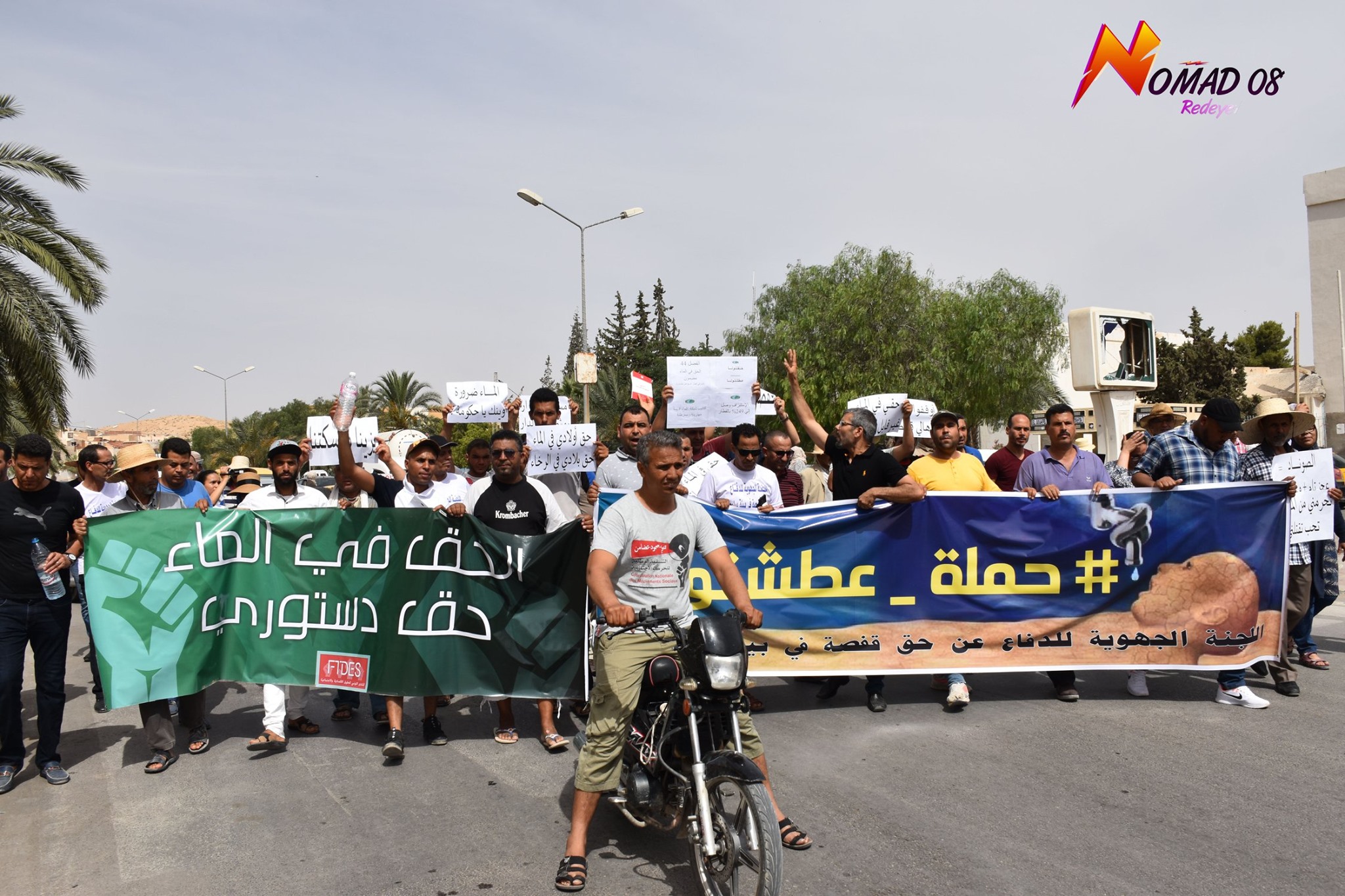In the absence of water, containment is impossible: for water accessible to all
Tunis, the 17th of April
Since March 21, 2020, the Tunisian government has decreed total containment for the entire population, following the Ministry of Health’s prescriptions stipulating the obligation to stay at home in order to limit the spread of the COVID-19 virus and prevent the number of cases from exploding.
At a time when most Tunisians are complaining of shortages of certain foodstuffs such as flour and semolina, and when others, forced to stop work until further notice, have turned to their savings to provide for their families, a significant number of Tunisians are worried about not being able to apply the hygiene and cleanliness instructions given by health professionals, for the simple reason that water is not accessible to them.
The FTDES has warned on several occasions[1] about the seriousness of the water shortage in several Tunisian regions, whether it be because of water cuts or its total absence.[2] In some localities in the interior of Tunisia, SONEDE is absent and agricultural development groups are unable to carry out their water supply mission, mainly because of debt problems. Inhabitants, especially women and children, therefore have to travel long distances to fetch water from the nearest source. These sources are in most cases unsuitable, either because their water is stagnant or because waste of all kinds is dumped there.
What has the state done to guarantee the minimum and indispensable needs of these citizens so that they can be confined serenely? How could these citizens, who would like to stay at home for their safety and that of their children, wash their hands several times a day when the litre of water they store in a corner of the house is so precious that washing their hands is almost a luxury in their eyes? This water is all the more precious at the present time since to get it, they have had to travel for miles and thus expose themselves to the Corona, while the majority of Tunisians run their taps for long minutes to make sure their hands are clean.
We have not seen measures commensurate with the urgency of the situation to guarantee everyone’s right to access to water, which is so crucial today. On the contrary, the State chose to increase Sonede’s tariffs during this period[3].
Thus, the FTDES :
– Alert on the distress of these citizens, who today run a great risk of contamination by COVID-19 because they are more exposed to the danger of the virus than their fellow citizens confined to their homes. This exposure is due to the long journeys they make every day in search of water and is aggravated since their immune system is already weakened by years of drinking unsafe water;
– Denounces the policy of homogenization adopted by decision-makers in the application of containment to all Tunisian citizens without taking into consideration the particular case of the population deprived of water ;
– Recalls that the right to water is a constitutional right and that the State should assume its responsibilities to guarantee this right to all, at the risk of seeing an increase in the number of cases of COVID-19 in thirsty rural areas;
– Finally, denounces the absurdity of the rules of cleanliness and hygiene put in place when equity in access to water is not ensured.
To resolve this situation, the FTDES :
– Calls for an extension of SONEDE’s decision to provide water to needy families and to defer payment of their debts, initially scheduled until 17 April, to cover the entire period of containment and allow all households to have continuous access to quality water. Water should be provided free of charge in this framework, at least for the vital part (first instalment);
– Encourages decision-makers to extend this decision to include the GDAs, in coordination with the STEG, and to monitor the proper return of water in all GDAs that provide drinking water ;
– Notes that some initiatives of the Regional Disaster Control Commissions (such as in Kairouan and Kasserine), have allowed the return of water in some GDAs but insists that even in these cases, disruptions in the distribution continue to exist (low flow, turbid water, short service duration…);
– Reiterates the request made to the government by civil society organizations to adopt a feminist policy in the current fight against Covid-19[4], because women and girls, particularly in rural areas, are more exposed to the risk of the virus, whether when they fetch water or when they work in agriculture[5] ;
– Calls on the Ministry of Agriculture and the People’s Assembly to open up the major legislative file of water supply in rural areas, taking into consideration the recommendations of civil society, including the Citizens’ Water Code, especially the establishment of an independent management structure in the countryside and the free provision of a quantity of water corresponding to vital needs.
[1] https://ftdes.net/leau-est-en-face-de-nous-et-on-meurt-de-soif/ ; https://ftdes.net/ar/%d8%a7%d9%84%d8%b9%d8%b1%d8%a8%d9%8a%d8%a9-%d8%a8%d9%8a%d8%a7%d9%86-%d8%a7%d9%84%d9%8a%d9%88%d9%85-%d8%a7%d9%84%d8%b9%d8%a7%d9%84%d9%85%d9%8a-%d9%84%d9%84%d9%85%d9%8a%d8%a7%d9%87/ ; https://www.facebook.com/permalink.php?story_fbid=3526422364095802&id=260780443993360 ; https://www.facebook.com/events/2695929780505006/ ; https://www.facebook.com/search/top/?q=%D8%B9%D8%B7%D8%B4%D8%AA%D9%88%D9%86%D8%A7&epa=SEARCH_BOX
[2] Some citizens are not connected to SONEDE and do not depend on a GDA either, as is the case for 15% of Kairouan’s rural population.
[3] https://www.watchwater.tn/ar/blog/2020/4/8/60-lhkom-ostthmr-lazm/
[4] https://ftdes.net/ar/lettre-ouverte-au-premier-ministre-pour-ladoption-dune-politique-feministe-dans-la-lutte-contre-lepidemie-du-covid-19/
